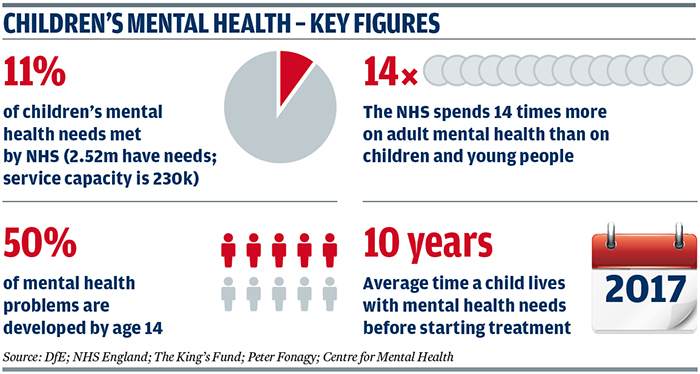
How do we solve a wicked issue? Wicked issues are big, adaptive problems that need lots of resource to solve, and co-ordinated national, local and community action. I would put children's mental health in this category.
As a commissioner, we would want to start by looking at some of the statistics about the service quality, volume, needs and outcomes to help create a sort of national joint strategic needs assessment.
Just think for a moment about the life experience of all the children and young people affected by mental ill health.
We have services that can deal with only one in 10 of the potential demand; we spend 14 times more money on adult mental health, but most of the need is there by the time a young person is 18; and children suffer with symptoms on average 10 years before they get help (see graphics).

One thing missing from this data is any outcome statistics. Unfortunately, most of what we measure is activity and not outcomes, which might be one of the reasons that mental health is a hidden issue in society.
The following statements from young people illustrate many of the challenges children's mental health services, commissioners and providers face:
- "It took a long time to get an appointment, then they expect everything to be sorted in four weeks"
- "Mental health sounds negative, like crazy or being mental - there's too much of a stigma attached to it"
- "You get spoken to like a child"
- "I want help at 3am"
- "I know we're not equal, but they treat us like we're not human"
Of all the challenges facing children's services, mental health best fits the description of a wicked issue that will require big changes in national policy and funding, local service redesign, and changes in how the community supports emotional wellbeing.
How can commissioners help?
You might think there is little we can do to change the system, but I'm an optimist. First, schools, parents, young people and communities are getting better at recognising and supporting mental health. Second, the science behind treatments and therapies is improving rapidly. Third, while the extra funding is just a splash in the ocean, mental health is finally on the national agenda.
We can begin to construct a commissioning strategy, incorporating these elements:
1. Increased universal and community support
As a commissioner, the only way we can meet the needs of 2.5 million children is by mobilising communities, schools and friends to help each other - through behaviour change, training, online materials and a local workforce that coaches teachers, young people and parents. Long-term, we are aiming for a tipping point in awareness, resilience and support to increase local capacity and early help.
2. Single point of access
Referrals from both families and staff should be channelled through an empathetic telephone service that can triage to the full range of community, universal, voluntary and specialist services. The triage function controls how the very limited resource in each area is used to meet demand, rather than relying on unco-ordinated thresholds and cost shunting between providers. Long-term, we want every enquiry to get a compassionate response, and support from the system of local services.
3. Double the capacity of specialist services
Research from Peter Fonagy What works for Whom? lists the treatments and therapies that give the best outcomes. If we couple this to local knowledge of the cost of intervention, we can identify the best balance of services to improve productivity. Long-term, if we can measure outcomes at each session, case manage based on these outcomes, and tweak delivery to include other agencies and parents, then we can increase capacity to help our young people.
But the above strategy is challenging - because this is a complex adaptive problem, the commissioning cannot be about changing a few contracts or pathways. Effective commissioning for mental health is about leading a transformation, engaging the whole workforce, and inspiring the community to think differently about children and young people.
This is the approach described by the 2015 government strategy Future in Mind and mental health Local Transformation Plans. They need your support to solve this wicked issue.
Richard Selwyn is a member of the Association of Directors of Children's Services resources and sustainability policy committee
@rjselwyn

